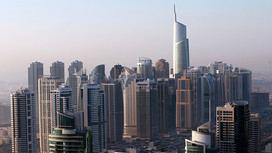Dubai optimism fails to mask concerns on overheating risk
Financial Times |

By Simeon Kerr
Four years after a sovereign debt crisis thrust Dubai on to the front pages for all the wrong reasons, the Gulf city-state is celebrating a trade and tourism-led renaissance.
Last month’s decision to award the World Expo 2020 to the United Arab Emirates’ commercial hub gave the once-bruised city a much-needed international stamp of approval. Hosting the event is expected to deliver a two per cent boost to GDP.
Mohammed al-Shaibani, chief executive of the state holding company Investment Corporation of Dubai, said the emirate is in an “extremely comfortable” position. “Things look very, very positive,” he told the Financial Times in an interview.
But the exuberance does not mask concerns that the economy is overheating, driving up the cost of living and potentially sparking another real estate correction. And a lack of legal reform is raising concerns that Dubai’s commercial platform will not be able to handle the coming years of breakneck development.
Trade has been central to the city’s revival as the commercial entrepôt stretches its geographical reach into central Asia and Africa, promoting itself as a challenger to prominent hubs such as Singapore.
Africa has replaced traditional commercial partner Iran as global financial sanctions squeezed trade, and a growing chunk of African trade – which has increased by 30 per cent in the last few years – is being carried out by Chinese companies.
According to one Chinese company owner who exports toys from Chenghai to the Gulf and onwards to Africa, Chinese firms now make up a third of Dubai’s central bazaar, once the preserve of Indian wholesale traders.
Mr Shaibani says the government is planning to expand by 30 per cent the traditional market and the city’s gold souk, an area that already accounts for a quarter of the emirate’s businesses.
Tourism and property are also helping fuel the renewed boom. Airport capacity, bolstered by the massive new Al Maktoum airport, is set to triple over the next decade as fast-growing Emirates airline grabs a larger share of the global long-haul market.
Property developments that were put on hold after the 2008 crash are being revived, and new schemes planned as prices have risen 28 per cent over the past 12 months, faster than anywhere else in the world, says Knight Frank, a property agency.
Although the authorities have implemented measures to stop speculation – such as tightening regulations and increasing property fees – the surge has prompted warnings from analysts and officials who are calling for better planning to prevent another cycle of boom and bust.
“The question of supply should be separated from speculative demand – the onus is on developers to go with a co-ordinated plan,” said Farouk Soussa, Middle East economist at Citigroup.
Victims of the last property crash remain in jail, with hundreds of investors who could not keep up payments incarcerated, prompting calls for reform of the country’s legal system.
One such victim, British developer Safi Qureshi, was jailed for two years in 2009 when a counter party illegally cashed guarantee cheques he had written. After he went on hunger strike, the authorities reviewed his case and released him.
Rather than returning to his native south London, however, Mr Qureshi is making Dubai his home, even though he has had to fight off more legal challenges since leaving prison.
“Opportunities exist in this region, and if you want to effect change then you have to be here,” he said.
Mr Shaibani said the government is studying how to decriminalise the bouncing of cheques, the most common form of financial security.
Yet the arbitrary, inefficient and opaque criminal justice system extends beyond financial crime. Tough social laws catch out many foreigners, leading to a steady flow of embarrassing news stories.
More controversies can be expected as Dubai’s population, which doubled to 2m over the past 10 years, accelerates and preparations for Expo 2020 increase global scrutiny.
Analysts say the government could attract more qualified professionals through long-term residency programmes, granting a more secure stake in this transient city.
But when Emirati commentator Sultan al-Qassemi suggested such reform, he was broadly criticised by many Dubai nationals, who make up less than 10 per cent of the population and increasingly feel like strangers in their own land.
Abdulkhaleq Abdulla, a professor of political science in Dubai, said such resistance is rooted in the “agony of the minority,” as national culture is submerged by foreign cultures.
But for Dubai to reach the next stage of development, clearer rule of law and regulatory transparency are needed, argued Singapore-based American author Parag Khanna, who is an adviser to the Dubai authorities.
Consistent application of a two-year residency visa linked to property is a basic way of securing the expatriate buy-in crucial to transforming Dubai into a global city, he said.
“People will only invest for the long-term and make Dubai their home if this is a reliable guarantee,” he added.
Read more article: The basic nature of employment will change significantly